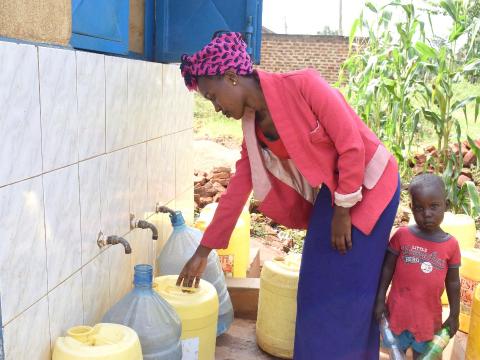How a piped water project came in handy to fight the spread of COVID-19

By Borrice Natukwatsa
“In the past years, Busia District —and more specifically Busia Municipal council— would never survive epidemics like cholera. I remember in 2014, Busia lost seven people and over 100 people were admitted with cholera at Busia Health Centre IV. The following year in 2015, about 241 were admitted and treated for the same. The majority of the cases were reported in Busia Municipal Council. This was attributed to poor sanitation, poor waste management and inadequate access to clean and safe drinking water,” says Chris Wanyama, a member of the Busia Village Health Teams (VHTs).
At the time, World Vision stepped in; engaging with community leaders and other stakeholders of Busia Municipality to come up with lasting solutions. Some of these solutions included identifying and training parish-level water user committees and community sanitation monitoring teams to ensure proper functionality of various water sources; as well as supporting extension of safe and clean piped water to villages that were water stressed, and those that did not have access to piped water.
Chris says during the accessibility assessment, Kisenyi B was mapped out as one of the villages that had limited access to piped water. The community was excited to hear the good news of the extension of piped water to their village.
Amos Wabwire, who lives in the community, says: “God has finally heard our outcry for safe and clean water.”
As a contribution, Amos offered part of his small plot of land to support the construction of a public water kiosk where households which could not afford their own tap water could still access safe and clean water. According to Chris, it was in September 2017 that World Vision completed the extension of piped water into Kisenyi B, constructed two public water kiosks and two stand taps. The constructed public stand taps and kiosks were handed over to the host landlords for management and maintenance.
Amos hired Patience Nayebale, a resident of the same village, to manage the kiosk. Patience, a mother of one, says she has been able to collect some money to take care of her family. On average, she collects UGX 30,000 (USD 8) for every 10 units of water sold. Out of this amount, she pays the municipal council national water office about UGX13,000 (USD 3.5) every four to five days and keeps the remaining UGX17,000 (USD 4.5) for herself.
With increased access to clean and safe piped water, the community now reports increased reduction in waterborne diseases among children (especially cholera). Patience says she now pays less on medical bills because her child rarely suffers from preventable diseases like dysentery and cholera.
Chris adds that having piped water in the village has also saved community members time that they previously used to look for water. The time is now used for more productive activities.
Fighting COVID-19
With access to clean and safe water, the community is able to fight the spread of COVID-19. Chris says with the current Ministry of Health guidelines calling for frequent hand-washing as part of the fight against the virus, the availability of clean and safe water at the public kiosks is very handy.
“We have enough water for hand-washing. The availability of clean and safe water has also made our work as VHTs much easier. We would expect questions like ‘how are we expected to frequently wash our hands when we can’t access the water?’ But now, whenever we go to sensitise the community about hand-washing, they are open to adhering to the message because they have the water,” he says.
